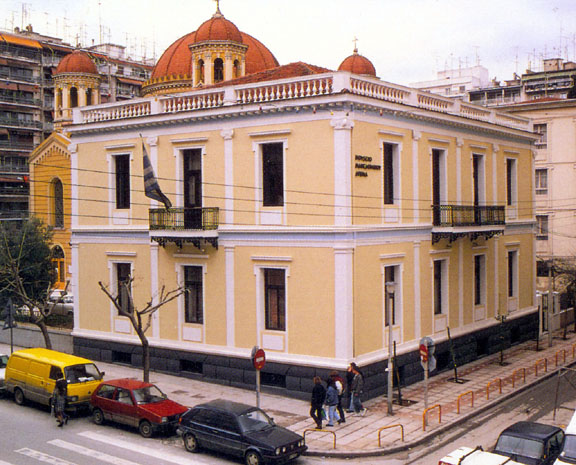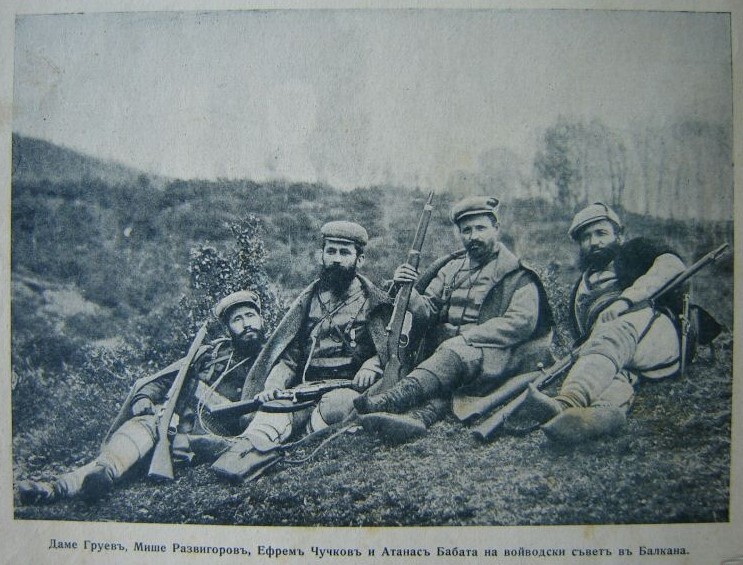|
Lazar Poptraykov
Lazar Poptraykov (Bulgarian: Лазар Поптрайков; Macedonian: Лазар Поп-Трајков) (10 April 1878–October 1903) was a Macedonian Bulgarian revolutionary (komitadji). He was also a Bulgarian Exarchate teacher and poet from Ottoman Macedonia. He was one of the leaders of the Internal Macedonian-Adrianople Revolutionary Organization (IMARO) in the region of Kastoria (Kostur) during the Ilinden Uprising. Despite his Bulgarian identification, per post-WWII Macedonian historiography he is considered as an ethnic Macedonian. Life Lazar Poptraykov was born in Dambeni, Ottoman Empire (now Dendrohori, Greece) on 10 April 1878. He studied at the local village school before moving to the Bulgarian junior high school in Kostur. Later he continued to study at the Bitola Bulgarian Classical High School and afterwards at Thessaloniki's Bulgarian Men High School. In Thessaloniki, one of his teachers was Pere Toshev. Poptraykov joined IMARO as early as 1895, inspi ... [...More Info...] [...Related Items...] OR: [Wikipedia] [Google] [Baidu] |
Macedonians (ethnic Group)
Macedonians ( mk, Македонци, Makedonci) are a nation and a South Slavs, South Slavic ethnic group native to the region of Macedonia (region), Macedonia in Southeast Europe. They speak Macedonian language, Macedonian, a South Slavic language. The large majority of Macedonians identify as Eastern Orthodox Christians, who speak a South Slavic language, and share a cultural and historical "Orthodox Byzantine–Slavic heritage" with their neighbours. About two-thirds of all ethnic Macedonians live in North Macedonia and there are also Macedonian diaspora, communities in a number of other countries. The concept of a Macedonian ethnicity, distinct from their Orthodox Balkan neighbours, is seen to be a comparatively newly emergent one. The earliest manifestations of an incipient Macedonian identity emerged during the second half of the 19th century among limited circles of Slavic-speaking intellectuals, predominantly outside the region of Macedonia. They arose after the Firs ... [...More Info...] [...Related Items...] OR: [Wikipedia] [Google] [Baidu] |
1878 Births
Events January–March * January 5 – Russo-Turkish War – Battle of Shipka Pass IV: Russian and Bulgarian forces defeat the Ottoman Empire. * January 9 – Umberto I becomes King of Italy. * January 17 – Battle of Philippopolis: Russian troops defeat the Turks. * January 23 – Benjamin Disraeli orders the British fleet to the Dardanelles. * January 24 – Russian revolutionary Vera Zasulich shoots at Fyodor Trepov, Governor of Saint Petersburg. * January 28 – ''The Yale News'' becomes the first daily college newspaper in the United States. * January 31 – Turkey agrees to an armistice at Adrianople. * February 2 – Greece declares war on the Ottoman Empire. * February 7 – Pope Pius IX dies, after a 31½ year reign (the longest definitely confirmed). * February 8 – The British fleet enters Turkish waters, and anchors off Istanbul; Russia threatens to occupy Istanbul, but does not carry out the threat. * Febru ... [...More Info...] [...Related Items...] OR: [Wikipedia] [Google] [Baidu] |
Germanos Karavangelis
Germanos Karavangelis ( el, Γερμανός Καραβαγγέλης, also transliterated as ''Yermanos'' and ''Karavaggelis'' or ''Karavagelis'', 1866–1935) was known for his service as Metropolitan Bishop of Kastoria and later Amaseia, Pontus. He was a member of the Hellenic Macedonian Committee and functioned as one of the major coordinators of the Greek Struggle for Macedonia. Early life and career Germanos Karavangelis was born Stylianos in 1866, in the village of Stipsi on Lesbos, then still under Ottoman rule. His father was a Psariot by the name of Chrysostomos and his mother was Maria. He had seven other siblings which included six sisters and one brother. When he was two years old, his family moved to Adramyttio, Asia-Minor (now Edremit, Turkey) where his father opened a shop. There, he attended school and was awarded a scholarship to study at the Theological School of Halki. He graduated in 1888, when he was ordained a Deacon and received the name Germanos. He th ... [...More Info...] [...Related Items...] OR: [Wikipedia] [Google] [Baidu] |
Macedonian Committee
The Macedonian Committee ( gr, Μακεδονικό Κομιτάτο, ''Makedoniko Komitato''), formally the Hellenic Macedonian Committee (Ελληνομακεδονικό Κομιτάτο, ''Ellinomakedoniko Komitato''), was a Greek revolutionary organization with the aim of liberating Macedonia from the Ottoman Empire (in the vilayets of Monastir and Salonika). Creation of the committee Despite the prior existence of Greek armed bands in the region of Ottoman Macedonia, it wasn't until 1900 when Stefanos Dragoumis founded the Hellenic Macedonian Committee, that an organized and coordinated effort was undertaken. The committee was led by the wealthy publisher Dimitrios Kalapothakis and its members included Greek aristocrats, politicians, and other Greek notables in addition to the guerrilla fighters. This included individuals such as Ion Dragoumis, Pavlos Melas, etc. The Hellenic Macedonian Committee served as the Greek answer to the IMRO following their increase in hostili ... [...More Info...] [...Related Items...] OR: [Wikipedia] [Google] [Baidu] |
Konstantinos Christou
Kottas Christou ( el, Κώττας Χρήστου) or Kote Hristov (Bulgarian/ Macedonian: Коте Христов), known simply as Kottas or Kote,, and often referred to as Konstantinos Christou ( el, Κωνσταντίνος Χρήστου), was a Slavophone revolutionary chieftain in Western Macedonia during the Macedonian Struggle. Kottas was born in the village of Roulia (Greek Ρούλια, Bulgarian/ Macedonian ''Руля/Руља''), in 1863, and was elder of Roulia from 1893 to 1896. He began anti-Ottoman rebel activity in 1898, killing four local Ottoman officers. He was first associated with the pro-Bulgarian Internal Macedonian Revolutionary Organization (IMRO). Afterwards he became associated with the pro-Greek irregular Hellenic Macedonian Committee. He was captured by the Ottomans, convicted of robbery and hanged in Monastir in 1905. Background Though a Slavophone, who only spoke Bulgarian, Kottas had a Greek identity. He was initially a member of the Intern ... [...More Info...] [...Related Items...] OR: [Wikipedia] [Google] [Baidu] |
Maslina Grancharova
Maslina Ivanova Grancharova (Bulgarian: Маслина Иванова Грънчарова; 1874–1958), also known as the Rayna Knyaginya of Kastoria (Bulgarian: Костурската Райна Княгиня), was a Bulgarian teacher and revolutionary from the village of Zagorichani (Bulgarian: Загоричани, present day Vassiliada), Manastir Vilayet, Ottoman Empire. She was a member of the Internal Macedonian Revolutionary Organization (IMRO) and participated in the Macedonian Struggle, most notably in the Ilinden Uprising. She sewed the flag that represented the liberation of Dumbeni (today Dendrochori), Kastoria from the Ottomans and was the flag-bearer for her unit during the Ilinden Uprising."МАСЛИНА ГРЪНЧАРОВА - КОСТУРСКАТА РАЙНА КНЯГИНЯ." ~ ЗАБРАВЕНИ ГЕРОИ ~. Web. 10 May 2011. . Biography Grancharova was born in 1874 in the small village of Zagorichani (today Vasiliada) in Kastoria during Ottoman rule. He ... [...More Info...] [...Related Items...] OR: [Wikipedia] [Google] [Baidu] |
Korçë
Korçë (; sq-definite, Korça) is the eighth most populous city of the Republic of Albania and the seat of Korçë County and Korçë Municipality. The total population is 75,994 (2011 census), in a total area of . It stands on a plateau some above sea level, surrounded by the Morava Mountains. The area of the Old Bazaar, including Mirahori Mosque, is considered as the urban core of the city. Founded by a local Ottoman Albanian lord, Ilias Bey Mirahori, the urban area of Korçë dates back to the late 15th century and the beginning of the 16th century, however its actual physiognomy was realized in the 19th century, during a period that corresponds with the rapid growth and development of the city. The Old Bazaar has played a dominant role in Albania's market history. Korçë is the largest city of eastern Albania and an important cultural and industrial centre. Name Korçë is named differently in other languages: rup, Curceaua, Curceao or Curciau; Serbian, Bulgaria ... [...More Info...] [...Related Items...] OR: [Wikipedia] [Google] [Baidu] |
Ottoman Turks
The Ottoman Turks ( tr, Osmanlı Türkleri), were the Turkic founding and sociopolitically the most dominant ethnic group of the Ottoman Empire ( 1299/1302–1922). Reliable information about the early history of Ottoman Turks remains scarce, but they take their Turkish name, ''Osmanlı'' ("Osman" became altered in some European languages as "Ottoman"), from the house of Osman I (reigned 1299–1326), the founder of the House of Osman, the ruling dynasty of the Ottoman Empire for its entire 624 years. Expanding from its base in Söğüt, the Ottoman principality began incorporating other Turkish-speaking Muslims and non-Turkish Christians. Crossing into Europe from the 1350s, coming to dominate the Mediterranean Sea and, in 1453, invading Constantinople (the capital city of the Byzantine Empire), the Ottoman Turks blocked all major land routes between Asia and Europe. Western Europeans had to find other ways to trade with the East. Brief history The "Ottomans" first ... [...More Info...] [...Related Items...] OR: [Wikipedia] [Google] [Baidu] |
Battle Of Lokvata
A battle is an occurrence of combat in warfare between opposing military units of any number or size. A war usually consists of multiple battles. In general, a battle is a military engagement that is well defined in duration, area, and force commitment. An engagement with only limited commitment between the forces and without decisive results is sometimes called a skirmish. The word "battle" can also be used infrequently to refer to an entire operational campaign, although this usage greatly diverges from its conventional or customary meaning. Generally, the word "battle" is used for such campaigns if referring to a protracted combat encounter in which either one or both of the combatants had the same methods, resources, and strategic objectives throughout the encounter. Some prominent examples of this would be the Battle of the Atlantic, Battle of Britain, and Battle of Stalingrad, all in World War II. Wars and military campaigns are guided by military strategy, whereas bat ... [...More Info...] [...Related Items...] OR: [Wikipedia] [Google] [Baidu] |
Dame Gruev
Damyan Yovanov Gruev (,The first names can also be transliterated as ''Damjan Jovanov'', after Bulgarian Дамян Йованов Груев and Macedonian Дамјан Јованов Груев. The last name is also sometimes rendered as ''Grueff''. originally spelled in pre-1945 Bulgarian orthography as ''Дамянъ Йовановъ Груевъ''; January 19, 1871 – December 23, 1906) was а Bulgarian teacher, revolutionary and insurgent leader in the Ottoman regions of Macedonia and Thrace. He was one of the six founders of the Internal Macedonian Revolutionary Organization. Despite his Bulgarian self-identification, according to the post-World War II Macedonian historiography, he was an ethnic Macedonian. Biography Early years Dame Gruev was born in 1871 in the village of Smilevo, Monastir Vilayet, Ottoman Empire (present-day North Macedonia). He received his elementary education in Smilevo and continued his education in the Bulgarian Men's High School of Thessa ... [...More Info...] [...Related Items...] OR: [Wikipedia] [Google] [Baidu] |







